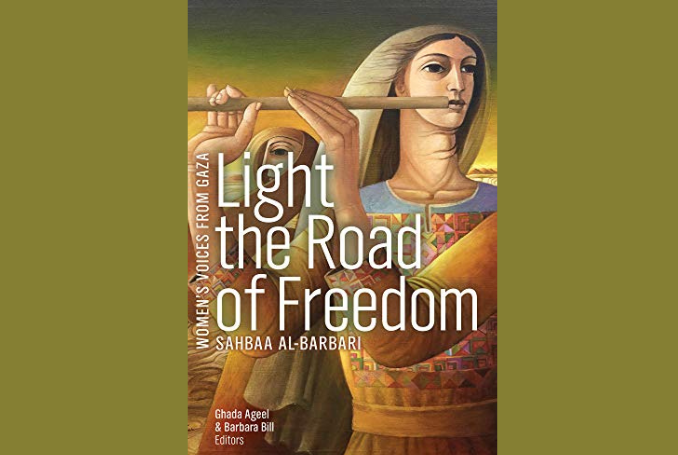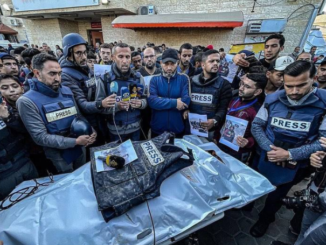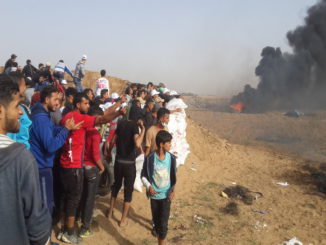
By Jim Miles
Light the Road of Freedom – Women’s Voices From Gaza. Sahbaa Al-Barbari, Ed. Ghada Ageel & Barbara Bill. University of Alberta Press, Edmonton, 2021.
This is the second volume in the series Women’s Voices From Gaza representing oral histories frequently denied their rightful place within the written historical record.
As with the first volume, A White Lie, the work starts with a preface and introduction which is identical to the first volume. The introduction provides a strong precis of the overall history of modern Palestine (post World War I). The indication is that the histories do not need to be read in any particular order but all are supplementary to each other.
The second work, Light the Road to Freedom by Sahbaa Al-Barbari, carries the same themes as the first, but under different circumstances. Education, family, and restrictions on movement are strong in both women’s stories; in this volume the perspective is from that of a Palestinian living much of her life in exile, moving from country to country necessitated by her husband’s work and Israeli actions and rules prohibiting their right of return.
Education
Education has always been emphasized in any volume about Palestine I have read, and this work is no different,
We are an educated people that cares enough to send our children to study outside or abroad – unlike what Israel tries to promote to the world, that we are uncivilized people.
….the teacher’s role is to try to engage with students and help them manage their problems, ease their discomfort, and provide them with the information, strategies, tools, knowledge, and morals like honesty and truth, in order to prepare them to deal with life – or at least try.
Ironically, her time in an Egyptian prison for her suspected communist beliefs and connections with the PLO provided her with strong educational experiences, both as teacher and student, “…where I learned so much, and the benefits were enormous.”
Exile
Al-Barbari lived in Cairo, Beirut, and Kuwait, before being allowed to return to Gaza after the Oslo Peace Accords gave permission for some exiles to return. Even with that her family remained dispersed, her children at different schools in Europe, and other family members remaining exiled throughout the Arab world.
She witnessed the attacks in Beirut moving from shelter to shelter; she lived in Tunis when Israeli agents attacked Palestinians exiled there; during the 1967 war she was in Cairo, which started her original denial of return. Through it all she writes, “My inner strength came from the worldwide international struggle against colonialism.”
Israel as Colonizer
Her criticisms of Israel follow two general trends. One is the frequency of assassinations, killing off leading cultural and political figures in exile or domestically,
In assassinating poets and writers, Israel assassinated the pen, the word, the art. And in killing Palestinian activists, Israel assassinated humanity.
The argument can be taken further: by killing the leaders it negates the Israeli argument that there is no one to negotiate with, no one seeking peace on the Palestinian side. It is,
…a continuation of the Zionist ethnic cleansing project that started in 1948….it’s the ultimate racism that Zionism is built on.
Al-Barbari states clearly the status of Israel and its actions,
Israel speaks about democracy, but in fact doesn’t have democracy. It is a country built on racism and discrimination, and it doesn’t treat its minority citizens well.
Israel is the only colonizer that remains in the world.
She takes the latter point a step back in history,
I personally believe that the responsibility for what happened in Palestine rests with Britain, whose Balfour Declaration [a simple letter from Balfour to Lord Rothschild] promised the Jews Palestine….Britain helped the Zionists establish their state by taking over our land.
The Future
The future is seen not for herself but for her children and probably her grandchildren to have the peace she wishes for, “We want peace and we want to live in real peace – one that is based on rights, not surrender.”
The two state solution as of her writing is her desired outcome, but as the international geopolitical situation changes and the domestic problems of Netanyahu’s extremist/racist government change, outcomes are impossible to predict. The wish for peace is the underlying element of both the first volume, A White Lie, and Al-Barbari’s volume; regardless of what they have suffered, living in peace, a real peace, is the basic demand.
Light the Road of Freedom is an important contribution to recording history as witnessed and experienced by the women and families of Palestine.

– Jim Miles is a Canadian educator and a regular contributor/columnist of opinion pieces and book reviews to Palestine Chronicles. His interest in this topic stems originally from an environmental perspective, which encompasses the militarization and economic subjugation of the global community and its commodification by corporate governance and by the American government.







